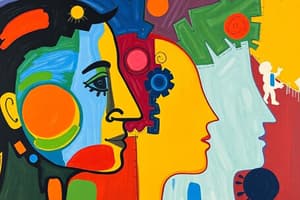Podcast
Questions and Answers
What is a beneficial approach to establishing a therapeutic relationship with older individuals?
What is a beneficial approach to establishing a therapeutic relationship with older individuals?
- Encouraging reminiscing about their life (correct)
- Discussing future plans and goals
- Conducting cognitive exercises
- Implementing physical exercise routines
Which of the following is a common myth regarding older adults?
Which of the following is a common myth regarding older adults?
- Older adults are always cranky (correct)
- Older adults are prone to being senile
- Seniors are generally satisfied with life throughout adulthood
- Seniors are usually lonely
What should be considered to assess the cognitive needs of older individuals?
What should be considered to assess the cognitive needs of older individuals?
- Introducing new technologies for mental stimulation
- Allowing time for processing and reacting (correct)
- Avoiding any disruptions in their routine
- Implementing complex learning tasks
How can one help older individuals cope with changes and challenges effectively?
How can one help older individuals cope with changes and challenges effectively?
Which strategy should be adopted when teaching older individuals to avoid patronizing behavior?
Which strategy should be adopted when teaching older individuals to avoid patronizing behavior?
How can physical needs of older individuals be better addressed during teaching sessions?
How can physical needs of older individuals be better addressed during teaching sessions?
Which factor should be assessed to determine the coping mechanisms of older individuals?
Which factor should be assessed to determine the coping mechanisms of older individuals?
Which of the following is a key element in assisting older individuals to maintain their independence?
Which of the following is a key element in assisting older individuals to maintain their independence?
What is an important consideration when teaching older individuals about new information that might disrupt established habits?
What is an important consideration when teaching older individuals about new information that might disrupt established habits?
Study Notes
Conservation and Psychosocial Development
- Children develop at different rates, leading to frustration and limited understanding of consequences.
- Children begin to master conservation, recognizing that object properties remain constant despite changes in appearance and position.
- Erickson's industry vs. inferiority stage: children develop self-concept, fear failure, and feel left out.
Teaching Strategies
- Include children in the learning process, using single, logical terms and observing their reactions.
- Parents should be taught to foster independence, gearing towards normal development.
- Use audiovisual aids, clarify terminology, and provide opportunities for privacy.
Adolescence (12-19 years old)
- Use adjunct instructional tools, clarify terminology, and share decision-making with adolescents.
- Approach them with respect, expecting some negative responses, and avoid confrontation.
Long-Term Learning
- Accept adolescents' personal fable and imaginary audience as valid, acknowledging their feelings.
- Allow them to test their own convictions and promote positive health actions in daily life.
Developmental Stages of Adulthood
Andragogy (Adult Learning)
- Knowles' framework assumes adults are self-directed, autonomous, and problem-centered learners.
- Adults accumulate experiences, and learning is based on social roles and tasks.
- Adults need structure, clear guidance, and concise information despite being autonomous.
Young Adulthood (20-40 years old)
- Establish long-term relationships, decide on occupations, and cope with stress.
- Physical abilities peak, cognitive capacity is fully developed, and intimacy vs. isolation is a psychosocial concern.
Teaching Strategies for Older Adults
- Understand older adults' development tasks, coping mechanisms, and meaning of life.
- Use reminiscing to establish therapeutic relationships, talking about their life and abilities.
- Accommodate physical needs, such as bright lighting, large print, and minimal noise.
Helpful Tips for Older Adults
- Eliminate extraneous noise, speak slowly, and keep sessions short with frequent breaks.
- Be aware of medication effects, avoid patronizing, and focus on relevant information.
- Allow time for processing and reacting, and summarize with time for questions.
Studying That Suits You
Use AI to generate personalized quizzes and flashcards to suit your learning preferences.
Description
Test your knowledge on psychosocial development according to Erickson's theory, focusing on industry vs inferiority stage. Explore barriers to learning such as development rates and frustration tolerance. Learn about teaching strategies to overcome obstacles in the learning process.




